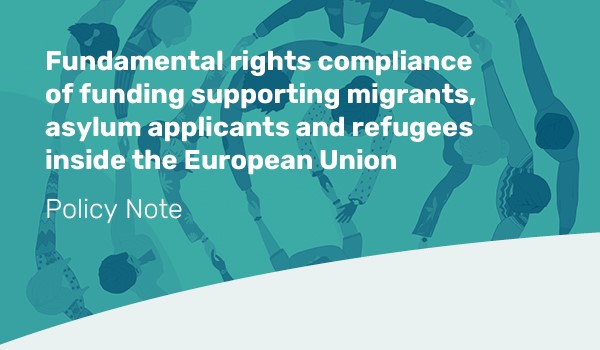This week, ECRE and PICUM have published a joint policy note on fundamental rights compliance of EU funding supporting actions in the areas of migration, asylum, inclusion, but also border and security, inside the European Union.
The current Multiannual Financial Framework (MFF) sets out reinforced safeguards on the application of the Charter of Fundamental Rights in EU funding expenditures at national level regulated by the Common Provisions Regulation. These new “horizontal enabling conditions” are binding for the main funding instruments for migration and asylum activities, such as the European Social Fund + (ESF+) and – for the first time – the Asylum, Migration and Integration Fund (AMIF), the Border Monitoring and Visa Instrument (BMVI), and the Internal Security Fund (ISF).
The paper highlights that the Member States and the European Commission have the duty to ensure that national programmes do not merely tick a box in a checklist when assessing fundamental rights compliance, and that there is a transparent and open process for beneficiaries and others to report on fundamental rights violations and contribute to a rights-based and effective use of EU resources. While the Member States have the primary responsibility to implement the horizontal enabling conditions in their national plans, the European Commission plays a key role in ensuring that the rules are respected.
The current MFF also outlines a more mainstreamed approach to the partnership principle, which requires that all relevant stakeholders, including civil society and fundamental rights bodies, should be involved in the management of EU funds at national level, with a role also in monitoring fundamental rights compliance. The policy note provides an overview of the potential legal and non-legal avenues that are available at national and European level for civil society organisations to contribute to the accountability of EU-funded actions and compliance with fundamental rights. Some of these pathways include joining the monitoring committees overseeing the implementation of EU funds at national level, but also the possibility to lodge complaints to different national and EU bodies.
The policy note provides an analysis of the measures and obligations arising for different actors in relation to fundamental rights requirements under the new legislation. It highlights opportunities for civil society organisations to contribute to the accountability of EU resources, and ends with a set of recommendations to policy makers on the operationalisation of fundamental rights obligations in the implementation of EU-funded national programmes.
For further information:
- Op-Ed, Partnership Principle in EU funds: Strong on Paper, Weak in Practice, March 2023
- ECRE and PICUM Policy Note, Partnership in practice: the role of civil society in EU funded actions for the inclusion of migrants and refugees, March 2020
This article appeared in the ECRE Weekly Bulletin. You can subscribe to the Weekly Bulletin here.

